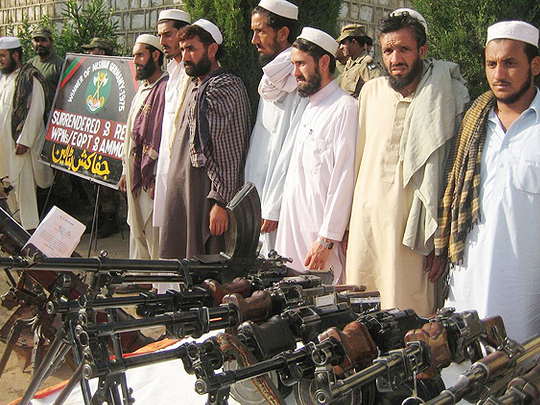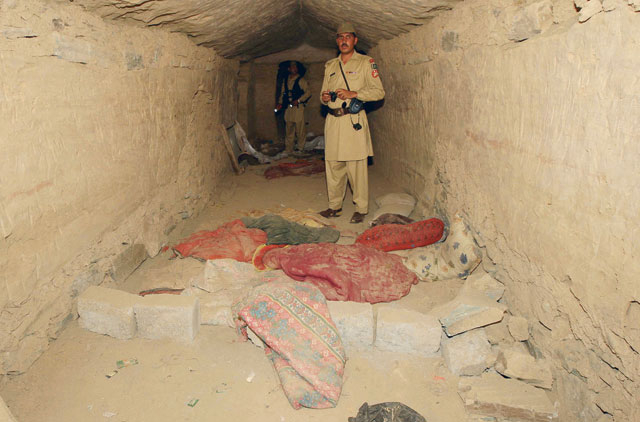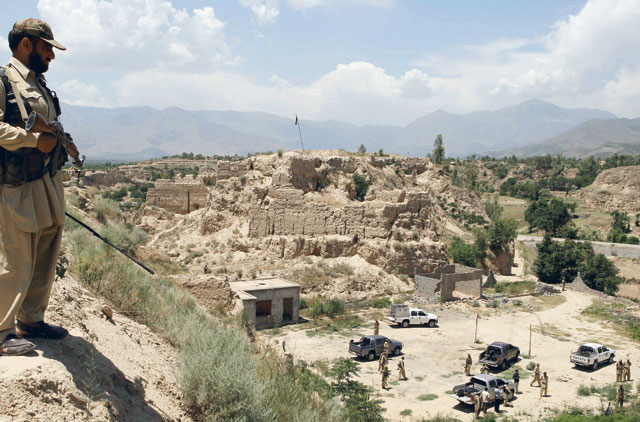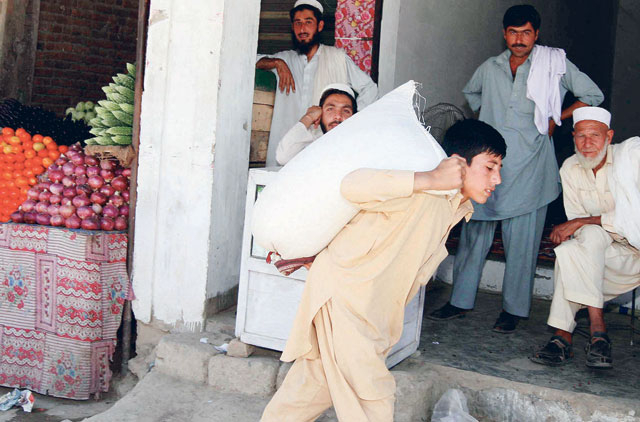
Khar: Nine-year-old Jamil Khan earns about Rs20 (less than Dh1) a day by working at a niswar (tobacco) shop in Khar Bazaar in Bajaur Agency to support his family.
His father was killed late last year during the military operation against Taliban and he, being the eldest son in the family, is now responsible to earn the bread and butter. "I can't go to school because I have to work to earn a living," Khan said in Pashtu as he does not speak Urdu.
Though his father was not member of any militant group, his family became victims of the fighting and his house was destroyed. "I can work hard but there is nothing to do here," he said.
There are hundreds and thousands of other victims of the war against terrorism who have lost their source of livelihood as they do not have jobs and their homes, business and shops were destroyed in the fighting between Taliban and the army.
Gulf News encountered Khan at a busy market in Khar, the capital of Bajaur Agency, which was recaptured by the Pakistan military after what they say was the toughest fight in the area since the military offensive against Taliban was launched.
It took about two years to regain the complete control of the area since the military launched its operation ‘Sherdil' (lion heart) in Bajaur Agency in September 2008.
The last battle was fought in February this year in Bajaur's Damadola area, the headquarters of Taliban who were in complete control and were running the government with their own extreme faction of ‘Islamic Sharia' courts.
Some 150 soldiers lost their lives and more than 600 got injured while more than 1,800 militants were killed. The area is not complety secured but under strict control of the Frontier Constabulary.
Gulf News is the first newspaper from the Gulf and Middle East region to be given access to this recently secured Agency, once considered the hub of Taliban insurgency, in an embedded military tour.
The Agency is one of the seven tribal areas in the Federally Administered Tribal Area (FATA) belt bordering Afghanistan's Kunar province where former Soviet army were defeated.
"We have done our job and those who do not believe us should come and see it with their own eyes. Now, it is the job of the world in general and the US in particular to compensate the victims of war," said Colonel Nauman Saeed, who led army operations in Bajaur Agency during the last two years.
He landed in the Agency by chopper in 2008 to establish Pakistan government's writ at a time when Taliban were running a parallel government in the area and were in complete control.
Bombed houses, destroyed infrastructure, bullet-riddled walls, heavy army patrolling and Frontier constabulary and aerial patrolling by Cobra helicopters greeted us as we were airlifted from Islamabad to the Bajaur Scouts headquarters, hub of the military operational command in the Agency.
Major Mohammad Jahanzeb Akhtar, operational officer, gave us a guided tour of caves, trenches, tunnels and houses which were built by the Taliban in Damadola area which is just 25km from the Afghan border. "Even aerial bombing could not destroy these bunkers which were tactfully carved inside the mountains. We physically fought for four days and night to capture this place and that's what broke the back of the Taliban," he said.
Earlier, talking to Gulf News in his operational headquarters, Colonel Saeed called the Pakistani Taliban a band of thieves, dacoits and downtrodden people of society with a religious bent of mind. The miscreants, he said, grabbed the opportunity and are riding the wave which created the Afghan Taliban, who are well organised and fighting with a strategy against the ‘invaders' which he says is their legitimate right.
Colonel Saeed criticised the word "donations or aid" for the people whom he called "victims of war". He wanted the world to launch a development programme without wasting time to reinforce the military success.
"The world is under the wrong perception that we are seeking ‘donations'. No, we need compensation and not ‘alms' for the victims of wars because the world in general and the US in particular owes it to us," he said in a stern voice. He said that they (Pakistan) are asking for the cost of the war, compensation of losses, both material and psychological, that "our people who were innocent and were not part of this war" suffered only because they happened to be there during the offensive.
"Innocent children, girls, women, families, old people, who suffered in the war only because they happened to be there need better treatment otherwise they will have grievances and could become an easy target for use by the Taliban again. Don't repeat the mistake and leave them in the lurch the way you did when the Soviet war ended," Colonel Saeed warned world powers.
More than 6,000 houses in the Agency of 1.2 million people were destroyed and 27,000 families were displaced during the war. "We need to hurry and reactivate their livelihood and launch projects for education, health, power supply and create jobs to avoid these people falling into the Taliban trap again."
He said though the area is secure, the situation can never be normal until Afghanistan is normal. "There is a very uneasy calm now."
Location is strategic for militant groups
Bajaur was an important hub for the Taliban and other militants. Its location is very sensitive and strategic as it borders Afghanistan in Northwest and Malakand Division (Swat) in South East while Mohmand tribal agency lies to the South. Bajaur has easy access to Afghanistan's Kunar and Nuristan provinces through four passes and countless animal paths and footpaths through the mountains. Kunar is a hotspot of Taliban activity and is the site of some of the deadliest attacks on US and Nato troops in Afghanistan. Militants escaped Bajaur and have set up save havens in Afghanistan on boundaries with Pakistan and the Kunar River.
Hot spot
Over 27,000 people displaced in Bajaur
- Area: 1290 sq km
- Population: 1.2 million (1998 census)
- Operation started: September 2008
- Area completely secured: March 2010
- Soldiers killed: 150
- Militants killed: 1,800
- House destroyed: 6,000
- Losses of property and business: Rs 6 billion
- Budget allocated for fiscal 2009-2010: Rs 970 million
- Families displaced: 27,000
- Urgent need: Rehabilitation of displaced people, education, health, power, food, jobs, cash compensation of victims of wars















